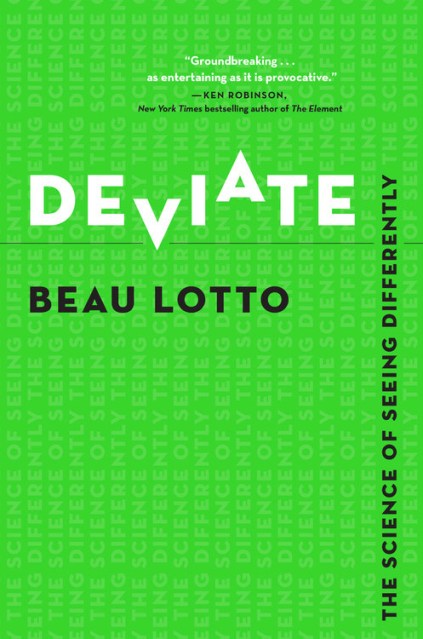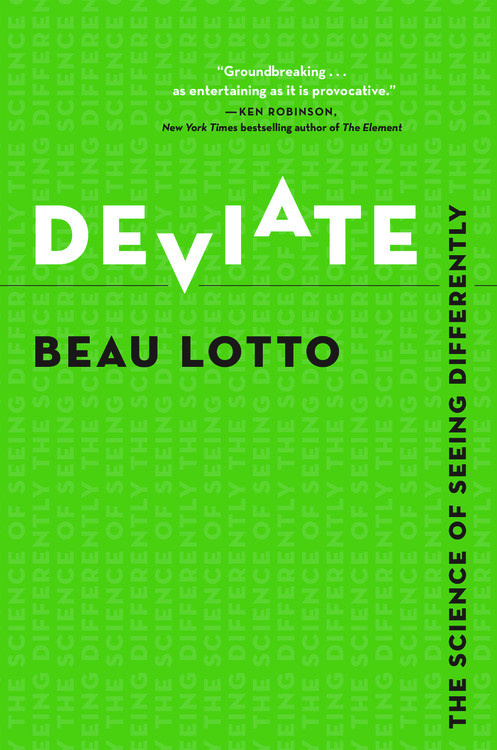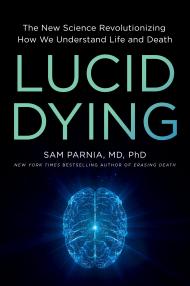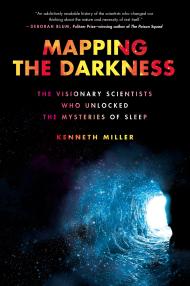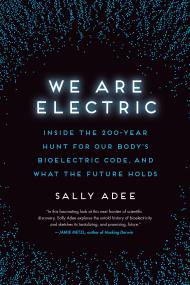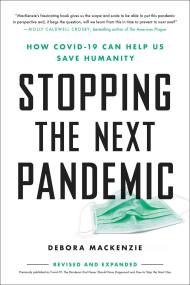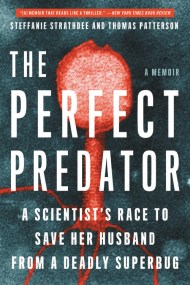By clicking “Accept,” you agree to the use of cookies and similar technologies on your device as set forth in our Cookie Policy and our Privacy Policy. Please note that certain cookies are essential for this website to function properly and do not require user consent to be deployed.
Deviate
The Science of Seeing Differently
Contributors
By Beau Lotto
Formats and Prices
- On Sale
- Apr 25, 2017
- Page Count
- 352 pages
- Publisher
- Grand Central Publishing
- ISBN-13
- 9780316300193
Price
$39.00Price
$49.00 CADFormat
Format:
- Hardcover $39.00 $49.00 CAD
- ebook $14.99 $19.99 CAD
- Audiobook Download (Unabridged) $24.98
This item is a preorder. Your payment method will be charged immediately, and the product is expected to ship on or around April 25, 2017. This date is subject to change due to shipping delays beyond our control.
Buy from Other Retailers:
Perception is the foundation of human experience, but few of us understand why we see what we do, much less how. By revealing the startling truths about the brain and its perceptions, Beau Lotto shows that the next big innovation is not a new technology: it is a new way of seeing.
In his first major book, Lotto draws on over two decades of pioneering research to explain that our brain didn’t evolve to see the world accurately. It can’t! Visually stunning, with entertaining illustrations and optical illusions throughout, and with clear and comprehensive explanations of the science behind how our perceptions operate, Deviate will revolutionize the way you see yourself, others and the world.
With this new understanding of how the brain functions, Deviate is not just an illuminating account of the neuroscience of thought, behavior, and creativity: it is a call to action, enlisting readers in their own journey of self-discovery.
-
"Deviate is an entertaining read that raises fascinating questions about how we perceive the world. Aside from being an accomplished scientist, Lotto is a talented writer who uses illustrative examples and visual experiments to dazzle and to teach."The Washington Post
-
"Provocative...a radical philosophy of perception...balanced by many astute observations."Nature
-
"Beau Lotto's Deviate is the beginning of a conversation-with yourself. Based on my years working at Pixar and with Tibetan Buddhist meditation masters, Beau is on exactly the right track for using neuroscience to understand the mechanisms that keep us stuck and the power of paying attention to the mind. And he does it with an infectious enthusiasm that cannot help but draw the reader into this engaging material."Lawrence Levy, former CFO of Pixar Animation Studiosand author of To Pixar and Beyond
-
"Lotto, a brilliant neuroscientist, explains why our perceptual hardwiring makes it difficult for us to live with uncertainty...His insights help us understand the mindset and talents-like asking great questions-that can help people live in the future as opposed to the past. Deviate shows us how to reengineer our brains and prepare ourselves to lead and innovate in our organizations and lives."Linda Hill, Professor of Business Administration atHarvard Business School and author of Becoming a Manager
-
"Deviate is a more accessible, fun, interactive version of Kahneman's Thinking, Fast and Slow-involving the reader in building an active understanding of the value of relying on perception as well as reason, and doing so in enjoyable ways. Beau Lotto is a powerful storyteller who bridges peer-reviewed science and the creative arts in rare ways to offer actionable insights."David Rowan, Editor-in-Chief Wired (UK edition)
-
"[A] sprightly look into the nature of things.... Among Lotto's most valuable contributions to our lay understanding of perception and thinking is his formulation of perception as an 'ecology,' meaning 'the relation of things to the things around them, and how they influence each other....' Lotto's provocative investigation into the mysterious workings of the mind will make readers just that much smarter."Kirkus Reviews
-
"Beau Lotto is one of the most creative scientists I know, and his passion for introducing neuroscience to the public ranks him among those rare communicators like Carl Sagan whose ideas can change peoples' thinking. At a time when many neuroscientists are pursuing the mindless goal of mapping all the connections in the human brain, Beau is right on target in his conviction that science advances by doubting the conventional wisdom and asking simple questions in a novel way."Dale Purves, Professor Emeritus at the Duke Institutefor Brain Sciences and member of the National Academy of Sciences
-
"Beau Lotto is the ideal writer for a popular book about the neuroscience of perception. He has already proved himself to be an immensely engaging and daring populariser of science. Above all, he is well-established neuroscientist who really knows what he is talking about. In this book he will convince you that our every-day experience of seeing is far more mysterious and exciting than it seems."Chris Frith, Professor of Neuroscience at UniversityCollege London
-
"In a brilliant and skillful way Beau Lotto pulls the rug from under our naive view of reality-bit by bit. In reading this book, we discover how our conventional way of seeing, of perceiving reality, is incomplete and illusory. He begins to dismantle this illusion by showing us why we see the world the way we do, and in doing so he opens the curtain to a new beginning, a new beginning of seeing past our individual interpretation of reality, to recognize that others may surely have a different interpretation. In daring us to deviate Lotto encourages us to discover that compassion has a root that can be revealed through scientific insights."Peter Baumann, Founder of Tangerine Dream
-
"In Deviate, Beau Lotto's remarkable research into human perception is crystallized into a series of astute explanations of how we experience reality. By bringing together an 'ecology of the senses' that goes beyond the mechanisms of the eye, Lotto's ingenious account of the brain's perceptive evolution arrives at an extraordinary proposition of how we can go beyond our current ways of seeing. Following Olafur Eliasson's words that 'what we have in common is that we are different,' Deviate unravels the bind to our human history in order to foresee a radically different future for a reconfigured, individual perception. It is a brilliant book!"Hans Ulrich Obrist, Director of the Serpentine Gallery(London)
-
"This is a neuroscience book that, while explaining what we know about the brain's functioning, explores the deeply personal issue of perception. Beau Lotto's insights constitute a real breakthrough in our understanding of how we perceive (and react to, and imagine ourselves within) reality. And his capacity to make complex scientific concepts and research results easy to understand, and to explain their relevance to our life, makes this an utterly readable book."Bruno Giussani, European director, TED
-
"Deviate by Beau Lotto promises to be a groundbreaking book that will be as entertaining as it is provocative. As human beings, we don't live in the world directly: we perceive and conceive it through many filters. What we do perceive is refracted through our own interests, dispositions and cultures and by the context in which we experience it. Deviate analyses and illustrates these processes with the precision and vitality that is the hallmark of Beau Lotto's work as a scientist and as a presenter. Among the libraries of quick fixes and formulaic programs, the need is growing too for well-grounded insights and tested strategies that reach to the roots of human understanding. Deviate is uniquely placed to meet this need. Given Beau Lotto's unique expertise and popularity, it will have a wide and enthusiastic audience."Ken Robinson, former director of the Arts inSchools Project and author of The Element: How Finding Your Passion ChangesEverything
-
"Beau Lotto shows better than anyone else how dependent we are upon our own limited sensory perceptions of the world. The radical thesis that he presents in Deviate reveals to us that reality is relative, and that we, ultimately, are capable of changing our world through changing our perception of it."Olafur Eliasson, Sculpture Artist and SpatialResearcher, founder of Studio Olafur Eliasson
-
"What if we all tried harder to be misunderstood? And what if we could embrace and channel our own misunderstanding of the world around us? Beau Lotto's Deviate honors the messy, imperfect genius of human perception as the most valuable resource for creative progress. Lotto is teaching us something so loudly fundamental to our existence, it seems almost impossible that we've missed it."Ross Martin Executive VP, Marketing Strategy andEngagement, Viacom
-
"If Richard Branson were a neuroscientist, he would probably be Beau Lotto. A visionary scientist and thinker, Lotto helps us to see the world anew...This is going to be a wonderful, ground-shaking book that has the power to change its readers lives for the better."John Bargh, James Rowland Angell Professor of Psychology
-
"His insights on human perception constitute a real breakthrough in our understanding of how we relate to (and react to, and imagine ourselves within) reality."Bruno Giussani, European director of TED and curator of TEDGlobal
-
"Beau Lotto is ideally placed to write a popular trade book about seeing...he is one of the most original and innovative thinkers that I have encountered."Ron Dennis CBE, Chief Executive and Chairman of the McLaren Group
-
"Beau Lotto engages us with a host of philosophical ideas and brain-changing experiences to explore why we see what we see and how we create. DEVIATE is beautifully written--giving us a truly novel, playful, and sophisticated window into the nature of human perception and innovation."Helen Fisher, Senior Research Fellow at the Kinsey Institute and author of Why We Love: The Nature and Chemistry of Romantic Love
-
"Combining evolutionary imperatives with modern imaging of the brain, Deviate helps us understand perception as the key to an individual's survival. It is written with humor, clarity, and delight. I highly recommend it."Jeremiah Harrison, leadguitarist of the Talking Heads
-
"Beau Lotto has delivered a fresh, provocative, stimulating, revealing neuro-inspired, entertaining text on that most fugitive of subjects-reality... The world of theoretical and experimental neuroscience has much to offer us as we search to produce better environments for all."Ian Ritchie, Director of Ian Ritchie Architects andarchitect of the largest free-standing glass building in the world
-
"Any reader interested in science, psychology, philosophy, or self-improvement willfind this groundbreaking work simultaneously engrossing and entertaining."Booklist
-
"As a neuroscientist and a specialist in vision Beau Lotto opens up the subject of just how it is possible to actually see and understand anything in the world when it seems that meanings are always constructed somehow separately form the reality of what we see. This is done with immense clarity and ease...directly relevant to anyone involved in shaping our world-designers, engineers, and architects."Alan Penn, Professor of Architectural and urbanComputing at University College London
-
"If someone else told me that reality is something we create in our heads-I'd up my medication. This brilliantly written book shows us that this is actually the road to liberation. We have the ability to change our internal landscapes, making our lives a masterpiece rather than a 'been there done that' cliché."Ruby Wax, OBE, comedian,actress, mental health campaigner, and bestselling author of How Do You WantMe?
-
"By revealing the startling truths about the brain and perception, author Lotto shows that the next big innovation is not a new technology: it is a new way of seeing....With an innovative combination of case studies and optical and perception illusion exercises, Deviate will revolutionize the way you see the world."The Week
-
"Deviate is the practical, enlightening, and groundbreaking guide that will not only provide an illuminating account of the neuroscience of thought, behavior, and creativity, it will ultimately motivate readers and thinkers everywhere to begin their own journey of self-discovery and reinvention."Hawaii Reporter
-
"Renowned neuroscientist Beau Lotto has been working all over the world in both the academic world and the public sphere (in education, the arts, and business), helping advance our understanding of perception and the brain...[Deviate] leaves you with a question that I hope will entice you to visit your local bookstore today, so you can pick up the book and read on."800 CEO Reads
-
"Explains why we can't see the world objectively--and humanity is better for it....DEVIATE challenges the very notion of how we think we see....By encouraging curiosity and learning to recognize and analyze our biases, we can create a culture driven by creativity and experimentation instead of safe stoicism."Quartz
-
"Deviate is the practical, enlightening, and groundbreaking guide that will not only provide an illuminating account of the neuroscience of thought, behavior, and creativity, it will ultimately motivate readers and thinkers everywhere to begin their own journey of self-discovery and reinvention."The Creativity Post
Newsletter Signup
By clicking ‘Sign Up,’ I acknowledge that I have read and agree to Hachette Book Group’s Privacy Policy and Terms of Use
